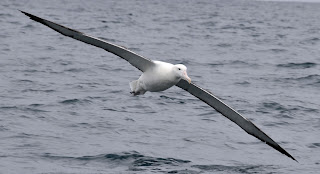This is a shot of a royal albatross, taken on the same day as the other albatross pics I've posted this week. It's not a very good photograph. Let me tell you whats wrong with it. Its not sharp, particularly around the all important eye area. Dynamic range is limited, so it looks flat and dull and the white patch on the bird's shoulder is overblown and has lost all detail. The corner to corner composition is sort of Ok but the body, and therefore the centre of attention, is smack in the middle of the frame giving a stolidity and a stillness to the shot which isn't the best presentation of what was there.
With regard to photographic equipment, the lens is far more important than the camera it is attached to, and my gear that day consisted of an extremely capable camera body, a Nikon D300, and a comparatively inexpensive Nikkor 18-200mm zoom. This particular lens is designed as a jack of all trades lens for enthusiastic amateurs who are probably going to be snapping away at their relatives and friends or at various bits of attractive scenery, and probably on nice sunny days. It's reasonably sharp and it makes a pretty decent job of most photographic tasks most of the time. The other two albatross shots are technically OK because they are well within the lens's capabilities, but standing on a moving boat, trying to shoot a fast moving subject which was a considerable distance away, the lens's limits were pretty obvious. I didn't even try to take pictures of most of the flying birds, and I probably shouldn't have tried with this one.
Photography is about what you see. But actually, the kind of gear you have will determine what you see and how you deal with what you see. For instance, taking pictures of flowers, I usually use a 105mm macro lens, which gives great results but it means that I tend to look at details rather than at overall patterns. I do have a lens which is good for birds, but as it is a great big heavy, cumbersome thing whose physical handling requires a bit of thought and adaptation, when using it I tend to look for subjects which I know will fit within its limitations.
The gear you have determines what you see and how you respond to it. It's true even when I leave the camera behind. My head is crammed full of all sorts of lenses- physical, social, cultural, political, spiritual, psychological - only some of which I am aware of, and each is dictating the pictures I'm framing and the actions I 'm taking. That's a good shot, I say to myself. But it's only when I sit in stillness and examine it for a bit that I realise that no, actually, it's not.
Photo: Nikon D300 Nikkor 18-200, 1/400 f10, iso200.
With regard to photographic equipment, the lens is far more important than the camera it is attached to, and my gear that day consisted of an extremely capable camera body, a Nikon D300, and a comparatively inexpensive Nikkor 18-200mm zoom. This particular lens is designed as a jack of all trades lens for enthusiastic amateurs who are probably going to be snapping away at their relatives and friends or at various bits of attractive scenery, and probably on nice sunny days. It's reasonably sharp and it makes a pretty decent job of most photographic tasks most of the time. The other two albatross shots are technically OK because they are well within the lens's capabilities, but standing on a moving boat, trying to shoot a fast moving subject which was a considerable distance away, the lens's limits were pretty obvious. I didn't even try to take pictures of most of the flying birds, and I probably shouldn't have tried with this one.
Photography is about what you see. But actually, the kind of gear you have will determine what you see and how you deal with what you see. For instance, taking pictures of flowers, I usually use a 105mm macro lens, which gives great results but it means that I tend to look at details rather than at overall patterns. I do have a lens which is good for birds, but as it is a great big heavy, cumbersome thing whose physical handling requires a bit of thought and adaptation, when using it I tend to look for subjects which I know will fit within its limitations.
The gear you have determines what you see and how you respond to it. It's true even when I leave the camera behind. My head is crammed full of all sorts of lenses- physical, social, cultural, political, spiritual, psychological - only some of which I am aware of, and each is dictating the pictures I'm framing and the actions I 'm taking. That's a good shot, I say to myself. But it's only when I sit in stillness and examine it for a bit that I realise that no, actually, it's not.
Photo: Nikon D300 Nikkor 18-200, 1/400 f10, iso200.


Comments